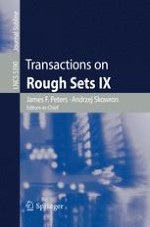2008 | OriginalPaper | Chapter
A Study in Granular Computing: On Classifiers Induced from Granular Reflections of Data
Authors : Lech Polkowski, Piotr Artiemjew
Published in: Transactions on Rough Sets IX
Publisher: Springer Berlin Heidelberg
Activate our intelligent search to find suitable subject content or patents.
Select sections of text to find matching patents with Artificial Intelligence. powered by
Select sections of text to find additional relevant content using AI-assisted search. powered by
Granular Computing as a paradigm in the area of Approximate Reasoning/Soft Computing, goes back to the idea of L. A. Zadeh (1979) of computing with collections of similar entities. Both fuzzy and rough set theories are immanently occupied with granules as atomic units of knowledge are inverse images of fuzzy membership functions in the first and indiscernibility classes in the other set theory.
Research on granulation in the framework of rough set theory has started soon after Zadeh’s program manifest (T.Y. Lin, L.Polkowski, Qing Liu, A.Skowron, J.Stepaniuk, Y.Y.Yao) with various tools from general theory of binary relations (T.Y.Lin, Y.Y.Yao), rough mereology (L.Polkowski, A.Skowron), approximation spaces (A. Skowron and J. Stepaniuk), logics for approximate reasoning (L.Polkowski, M. Semeniuk-Polkowska, Qing Liu).
The program of granular computing requires that granules formed from entities described by data should enter computing process as elementary units of computation; this program has been pursued in some aspects of reasoning under uncertainty like fusion of knowledge, rough–neural computing, many agent systems.
In this work, granules of knowledge are exploited in tasks of classification of data. This research is a follow–up on the program initiated by the first author in plenary talks at IEEE International Conferences on Granular Computing in Beijing, 2005, and Atlanta, 2006. The idea of this program consists in granulating data and creating a granular data set (called the granular reflection of the original data set); due to expected in the process of granulation smoothing of data, eliminating of outliers, and averaging of attribute values, classification on the basis of granular data is expected to be of satisfactory quality, i.e., granulation should preserve information encoded in data to a satisfactory degre. It should be stressed, however, that the proposed process of building a granular structure involves a few random procedures (factoring attributes through a granule, selection of a granular covering of the universe of objects) which makes it difficult for a rigorous analysis.
It is the aim of this work to verify the program of granular classification on the basis of experiments with real data.
Granules of knowledge are in this work defined and computed on lines proposed by Polkowski in teh framework of rough mereology: it does involve usage of similarity measures called rough inclusions along with techniques of mereological theory of concepts. In consequence, definitions of granules are invariant with respect to the choice of the underlying similarity measure.
Granules of knowledge enter the realm of classification problems in this work from a three–fold perspective: first, granulated data sets give rise to new data sets on which classifiers are tested and the results are compared to results obtained with the same classifiers on the original data sets; next, granules of training objects as well as granules of rules obtained from the training set vote for value of decision at a test object; this is repeated with granules of granular reflections of granules and with granules of rules obtained from granulated data sets. Finally, the voting is augmented with weights resulting from the distribution of attribute values between the test object and training objects.
In the first case, the rough inclusion based on Hamming’s metric is applied (or, equivalently, it is the rough inclusion produced from the archimedean t–norm of Łukasiewicz); in the last two cases, rough inclusions are produced on the basis of residual implications induced from continuous t–norms of Łukasiewicz, the product t–norm, and the minimum t–norm, respectively.
In all cases results of experiments on chosen real data sets, most often used as a test data for rough set methods, are very satisfactory, and, in some cases, offer results better than many other rough set based classification methods.
